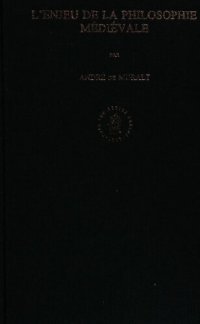
Ebook: L'enjeu de la philosophie médiévale
Author: André de Muralt
- Genre: Other Social Sciences // Philosophy
- Tags: Medieval Philosophy Renaissance Andre Muralt distinctio formalis esse objectivum
- Year: 1991
- Edition: BRILL
- Language: French
- pdf
Ce volume degage les racines medievales des themes principaux de la philosophie contemporaine. Il montre les consequences de la "distinctio formalis" sur les notions medievales et modernes de la causalite, par la sur celles de "l'esse objectivum" (Scot) et du signifie propositionnel (Gregoire de Rimini) dans le connaitre humain, enfin le prolongement de ces dernier themes dans les doctrines de l'idee de la philosophie moderne, du "Satz" de Bolzano, du "Sinn," du "Gedanke" de Husserl, Frege ou Wittgenstein. Parallelement il montre, a partir des memes principes, l'elaboration 'voluntariste' de la notion de finalite, dans la metaphysique occamienne de l'idee divine dans les doctrines de la providence divine de Scot et de Bradwardine, compareees a celle de Thomas D'Aquin. Il peut ainsi degager la perspective doctrinale dans laquelles s'inserent Molina, Leibnitz et Secretan, sinon certaines positions de la biologie et de la physique contemporaines.
This book examines the medieval origins of certain themes in modern and contemporary philosophy. Scotus'"distinctio formalis" plays a fundamental role in his and Ockham's conceptions of causality, and in the medieval theories of knowledge based on the "esse objectivum" (Scotus and his school) and on the "complexe significatum" (Gregory of Rimini). These theories of knowledge are connected with the theories of ideas in modern philosophy, with Bolzano's "Satz," the "Sinn" and the "Gedanke" of Frege, Husserl or Wittgenstein. The same principles determine the 'voluntarist' conception of finality, to be found in Ockham's doctrine of divine ideas, and in the doctrines of Scotus and Bradwardine on divine providence. Scotus' theory of divine causation hasimplications in Molina, Leibnitz, and Secretan, whereas the position of Aquinas is surprisingly close to that of biology and physics today.
This book examines the medieval origins of certain themes in modern and contemporary philosophy. Scotus'"distinctio formalis" plays a fundamental role in his and Ockham's conceptions of causality, and in the medieval theories of knowledge based on the "esse objectivum" (Scotus and his school) and on the "complexe significatum" (Gregory of Rimini). These theories of knowledge are connected with the theories of ideas in modern philosophy, with Bolzano's "Satz," the "Sinn" and the "Gedanke" of Frege, Husserl or Wittgenstein. The same principles determine the 'voluntarist' conception of finality, to be found in Ockham's doctrine of divine ideas, and in the doctrines of Scotus and Bradwardine on divine providence. Scotus' theory of divine causation hasimplications in Molina, Leibnitz, and Secretan, whereas the position of Aquinas is surprisingly close to that of biology and physics today.
Download the book L'enjeu de la philosophie médiévale for free or read online
Continue reading on any device:

Last viewed books
Related books
{related-news}
Comments (0)